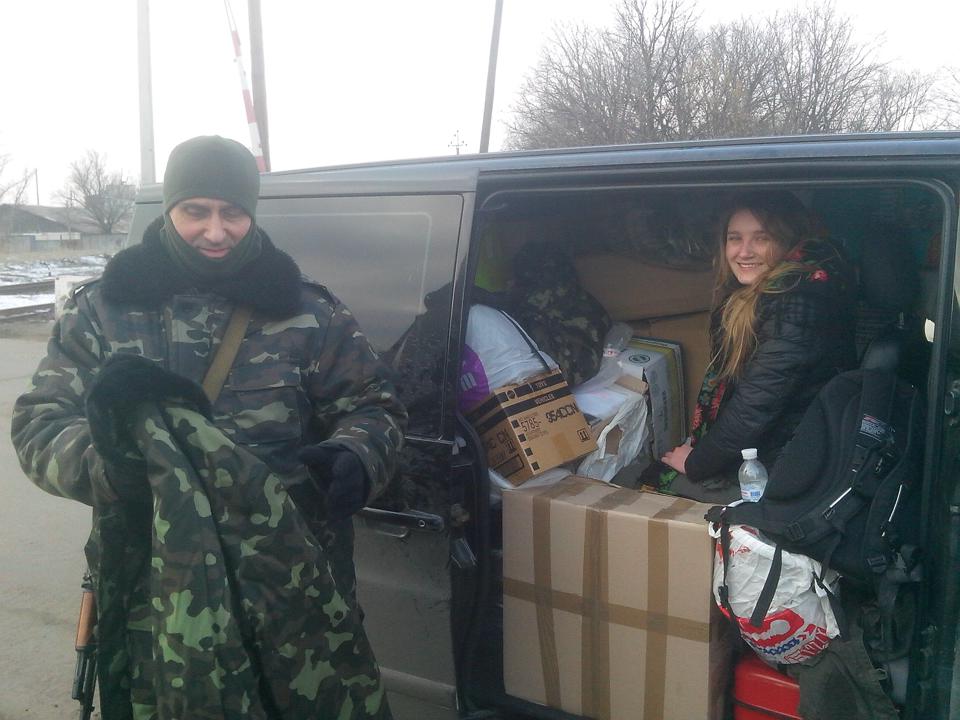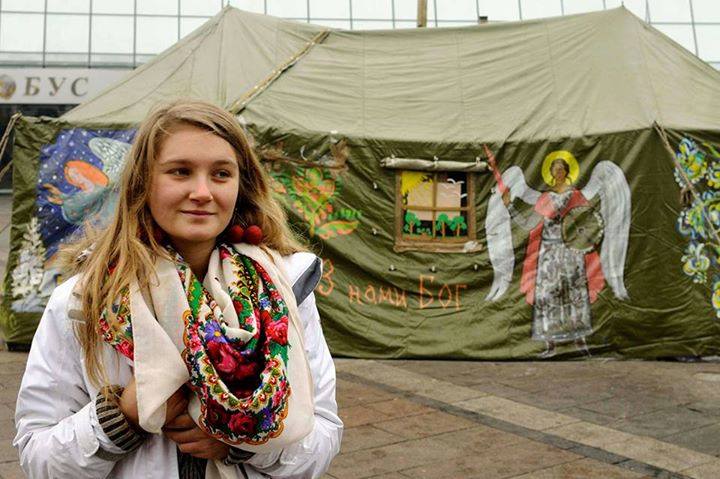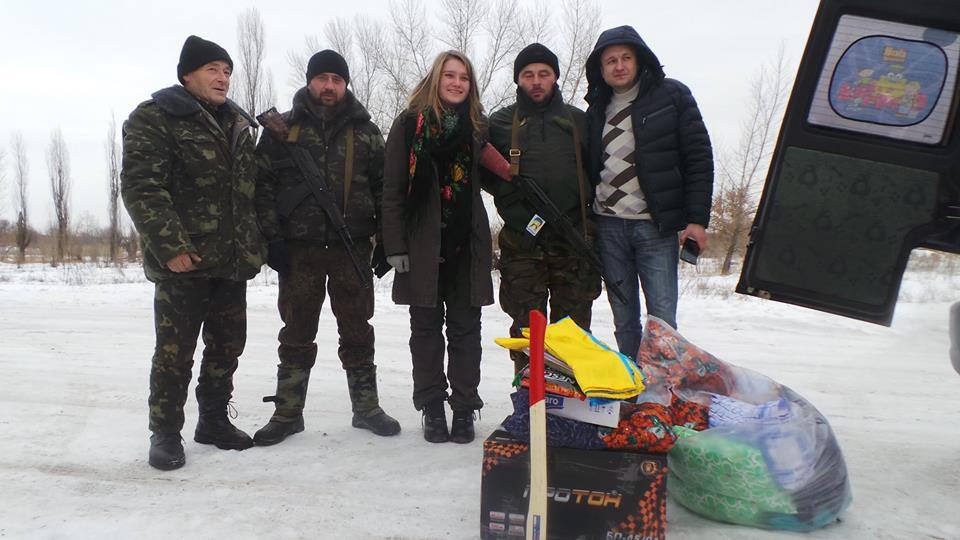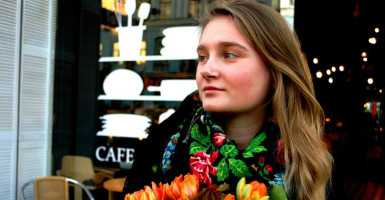KYIV, Ukraine—Ivona Kostyna couldn’t leave the war even if she wanted to.
It was December 2014 and, at age 18, the civilian volunteer was delivering supplies to Ukrainian troops stationed in the front-line town of Debaltseve.
Her car broke down, and in the six days it took to make repairs she lived among the soldiers. They were hunkered down in foxholes and in trenches in anticipation of an offensive by combined Russian-separatist forces.
The attack ultimately would take place less than two months later in February 2015—days after the signing of the Ukraine war’s second cease-fire.
Kostyna was supposed to spend only a few hours on the front lines. That’s how it usually was when she delivered supplies. She would arrive in her old, beat-up car, often under artillery and sniper fire, drop off a load of items such as uniforms, boots and food, and then hightail it back out of the war zone.
She understood the terror of war, voluntarily risking her life time and again to visit the troops. And over time she became good friends with many of the soldiers she encountered.

For her 18th birthday, Kostyna’s friends bought her a bulletproof vest and a helmet. (Photo: Courtesy of Ivona Kostyna)
But those six days in Debaltseve gave her a different, more intimate look at the soldiers and their personal struggles. She gleaned insights, which had eluded her in previous, shorter stays on the front lines.
“It was the first time I spent so much time in one visit and was tight with one group,” she says in an interview with The Daily Signal. “It was the first time I visited all their positions and heard what their problems were.”
One soldier told her that he had gone home for a few days of leave, and his wife met him at the train station with divorce papers in hand. “He was never the same again,” Kostyna says.
Another soldier explained a phone conversation with his son, in which he asked his father why another man had moved into their home.
She heard many stories of divorces, shattered home lives, and some of suicides. As the stories of heartache and broken lives accumulated, Kostyna’s perception of the true nature of the soldiers was transformed:
I had this image of soldiers as big, strong, tough guys. But I saw some of them shed a tear, and I realized then that the experience of war changes their lives. From then on, most of them have some degree of sadness. They all have their ‘back at home’ stories, and while they are in war they are sheltered from these problems. But if they have no motivation to go back home and face these problems, they have no reason to survive.
She adds: “They needed to be heard, and I was there to listen.”
Moving Forward
Kostyna, now 19, sips on tea at Kupidon, an underground bar in Kyiv, which is popular among journalists, writers, diplomats and soldiers. She has long, dirty-blond hair, and angular features. She maintains eye contact as she speaks quickly and fluently in British-accented English.
With breathless enthusiasm, she explains the program she has developed to treat Ukrainian war veterans for post-traumatic stress and ease their transition from military to civilian life.
“They cannot live as they lived previously,” she says of the soldiers. “They need to know how to transform their lives.”
Debaltseve taught Kostyna that many Ukrainian soldiers will need help in the transition back to civilian life. And she understood that there are few official resources or programs available in Ukraine to care for the mental health needs of combat veterans.
The January following her six days in Debaltseve, Kostyna began researching ways to care for the mental health of returning veterans. She brainstormed with a friend and landed on the ambitious idea of a veterans rehabilitation center, run by a professional staff and comprising a team of counselors who are combat veterans.
In March 2015, while continuing to make supply runs to the front lines, she dedicated herself full time to the project. She explains:
We teach veterans to talk to veterans. It’s not me who is talking to veterans, it’s another veteran. They speak the same language. I can tell them about families, I can tell them about the experience of a volunteer, but I’m not allowed to tell him how he feels because I’m a volunteer not a veteran.
Kostyna’s ambitions took a leap toward becoming reality in September, when she was made deputy director of Pobratymy, the fundraising arm of the Ukrainian scouting organization. She now spearheads the rehabilitation center project, which is called “Sector V.”
She’s landed several sponsors, Kostyna says, and is applying for grants to secure the remaining money necessary to lease a facility and pay a full-time staff, including 30 fully qualified trainers.
By July, Kostyna hopes to run the first iteration of a 45-day residency program for up to 60 soldiers at a time, including three visits by up to seven family members.
In addition to treatment for post-traumatic stress, the program will teach soldiers professional skills to help them land jobs. It will provide counseling for families about what to expect as their loved ones transition from war to peace.
“We give them skills for employment here and abroad,” Kostyna says. “We teach them how to communicate with their families, and we teach their families how to interact with them. We make the soldiers feel at peace psychologically, and then we help them understand where they are heading.”
Challenges and Stigmas
According to data from the Ukrainian Ministry of Defense, in two years there will be about 250,000 veterans of the Ukraine war, many of whom will have experienced combat firsthand in the trenches and razed villages of eastern Ukraine.
“In two years, this will be the main problem in Ukraine,” Kostyna says. “If we don’t take care of our soldiers, we don’t deserve a harmonious, good future.”
Last year, the Ukrainian government allocated 600 million Hryvnia (about $23 million) to treating post-traumatic stress. The problem, according to some experts, is that the money was dispersed within the Ministry of Health, tying up the funds in ineffective treatment protocols.
The Ministry of Defense puts the official number of military suicides since the war began at around 170. However, many soldiers and military experts claim that suicide is a more widespread problem than official data suggests.
They say the number of suicides is vastly underreported by commanding officers and soldiers on the front lines to safeguard the payouts of death benefits for surviving families and to preserve the honor of soldiers who take their own lives.
The undeclared nature of the Ukraine war also tests the mental resiliency of returning Ukrainian soldiers, leaving some to question the utility of their sacrifice and the sacrifices of fallen comrades.
“Our war is not declared. Understanding that you are in a real war, and the fact that people know it and declare it is important for the soldiers,” Kostyna says.
The Ukrainian government officially labels the war in eastern Ukraine an “Anti-Terrorist Operation.”

Stories of the soldiers’ personal hardships and wrecked lives inspired Kostyna to develop a treatment program for post-traumatic stress. (Photo: Myroslava Bezman)
Another challenge is the lingering stigma surrounding mental health care in Ukraine, dating back to the Soviet era when psychiatric treatment was used as a form of punishment. Compounding the issue, Ukraine lacks professionally trained psychologists and psychiatrists, leaving those who wish to seek help with few appealing options.
“In Ukraine, psychiatry is not a forbidden topic, but there’s little faith in seeking professional care,” Kostyna says, adding that some soldiers are reluctant to seek help because Ukrainian media has misrepresented what post-traumatic stress really is.
“The media makes it seem like post-traumatic stress only happens after war is over,” she explains:
It scares soldiers, because they don’t want to be sick. We need to show them that the strongest men are the ones who talk about what they have experienced. These men are an example to their comrades; they show the new strength that comes from the acceptance of themselves.
Sense of Purpose
Kostyna describes the sounds of artillery and the experience of a Grad rocket attack in a matter-of-fact way common among the most hardened of combat veterans.
“I don’t feel the adrenaline a lot any more,” she says. “It’s not really fear or a rush. It sounds bad, but you feel good about being a part of what’s happening. When I’m 40, I can say I experienced this. When it happened to my country, I witnessed it and played a part in it.”
She pauses for a moment, as if deciding how to articulate a complicated thought, and then continues: “I miss it. I really miss it. The needle of war. These terrible things that might scare someone else—it makes you feel good.”
Like many of the soldiers she has dedicated herself to helping, Kostyna understands firsthand both the appeal and the long-term emotional consequences of war.
She explains how war sometimes can jade one to beauty. She recalls a trip to the front lines when she remarked to one soldier how beautiful the flowers looked blooming in surrounding fields. The soldier told her that he had been there for months and had never noticed the flowers.
Kostyna long has been fascinated by the psychology of soldiers in war. She grew up reading books about past conflicts, and at one point considered joining the military as a medic.
These inclinations left Kostyna feeling out of place as she grew up. At age 15, she decided that she would put off university until she had decided what her calling was. And when she was 16, she took off on a solo backpacking trip across Europe.
Kostyna eventually found her elusive sense of purpose in war.
Her first experience with combat was during the February 2014 revolution, which transformed Kyiv’s central square, the Maidan, into a veritable war zone, replete with snipers, Molotov cocktails, indiscriminate gunfire, and police beatings.
Kostyna, 17 at the time, stepped up and took a leadership position during the revolution, effectively managing the daily lives of more than 40 protesters. She ran a kitchen and organized a protection detail provided by a group of Afghanistan war veterans.
“I lost a friend to the Berkut soldiers,” she says, referring to the special police force that Ukrainian President Viktor Yanukovych, later deposed, unleashed on the Maidan protesters. “And it was a hard loss for me.”
When the war began in eastern Ukraine in spring 2014, Kostyna says, she began to receive messages from friends who had gone to the front to fight. They didn’t have the most basic supplies—including basics such as socks, underwear, uniforms, and food—and they asked for help.
Drawn by both the desire to assist the soldiers as well as her lingering curiosity about war, Kostyna led a fundraising effort to buy the needed supplies and deliver them to the war zone.
Her first trip to the front lines was in September 2014, and since then she has taken many others. She says her parents were fearful for her safety at first and only grudgingly supportive—but they increasingly see the value in what she’s doing.
“I understood he was really proud of me by the end of the Maidan,” Kostyna says of her father.
Consequences
The psychological toll of the Ukraine war and the 2014 revolution affects more than Ukraine’s military. Also susceptible to post-traumatic stress are protesters who were on the Maidan, the families of fallen soldiers, and volunteers and some journalists who frequently visit the war zone.
“My friend lost her husband in the war, and she spent four days in morgues looking for him,” Kostyna says. “She was 21.”
She adds: “We have a lot of people who are not military, but who are participating in the conflict. All of us have our own trauma.”
Kostyna’s personal experience with post-traumatic stress has been an inspiration for her outreach to Ukraine’s veterans:
I lost a lot of people, and I broke. I had flashbacks, and nightmares, and loneliness. It took me time to get out of there. And when I worked with the military, I realized that what I’m going through is a small part of what they’re going through.
The seemingly endless conflict and the nebulousness of its intended outcome has led to widespread feelings of depression among both soldiers and civilian volunteers like Kostyna.

In two years, 250,000 Ukrainian soldiers will have served in the war, highlighting a looming epidemic of post-traumatic stress, Kostyna says. (Photo: Courtesy of Ivona Kostyna)
Many of the civilian volunteers who deliver supplies are in their 20s and 30s. They often experience a broad geographic scope of the war and get to know a large number of soldiers. Consequently, when soldiers are killed in combat there’s a good chance they’re an acquaintance, sometimes a friend.
The repeated trips to the war, interspersed with time in the peaceful sanctuary of large cities like Kyiv, where the war feels like a rumor and not reality, can leave the civilian volunteers’ minds spinning, unable to anchor in the mentality necessary for survival in either peace or war.
Kostyna struggles to maintain relationships with her friends who stayed behind and out of the conflict. She always carries the war with her, and finds it hard to talk about anything else.
She also misses the sense of purpose and simplicity of life on the front lines—feelings that are difficult to recreate in big city life, especially when people seem to go on living as if the war, which is only a one-day car ride from Kyiv, doesn’t really exist.
“For my 18th birthday, my friends bought me a bulletproof vest and a helmet,” Kostyna says. “But I’ve lost touch with most of my friends from before the war.”
Kostyna pauses, looks down and takes a sip of tea. Placing the porcelain cup back on its saucer, she looks back up and adds:
I don’t want to help the world. This is what makes me feel good. I can understand what happened to me. And if I can do that, then I can help someone else. The war will end some day, and we will need to move forward.
Ivona Kostyna will be a featured panelist at a lecture and panel discussion about post-traumatic stress in Ukraine, to be held Feb. 18 at 12 noon ET (7 p.m. local time) at the America House in Kyiv. Visit the America House website for details.
























